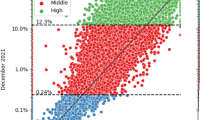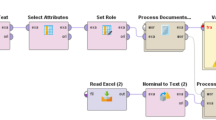Abstract
By considering Korea’s presidential election on December 19, 2012, this study examines how a presidential campaign can be measured using (negative) entropy indicators. We collected data from Google-indexed web documents, Twitter, and Facebook for four time periods. More specifically, we measured bilateral, trilateral, and quadruple relationships based on the number of web and social media mentions referring only to a candidate (this is, no mention of other candidates or the term “president”). The results indicate that Twitter tended to generate the highest entropy value across the three time periods but that President Geun-Hye Park outperformed the other candidates across all three periods on Google in terms of (negative) entropy indicators.




Similar content being viewed by others
References
Abramson, N. (1963). Information theory and coding. New York: McGraw-Hill.
Ackland, R., & O’Neil, M. (2011). Online collective identity: The case of the environmental movement. Social Networks, 33(3), 177–190.
Barash, V., & Golder, S. (2010). Twitter: conversation, entertainment and information, all in one network. In D. Hansen, B. Shneiderman, & M. Smith (Eds.), Analyzing social media networks with NodeXL: Insights from a connected world (pp 143–164). Burlington: Morgan Kaufmann Publisher.
Bond, R. M., Fariss, C. J., Jones, J. J., Kramer, A. D. I., Marlow, C., Settle, J. E., et al. (2012). A 61-million-person experiment in social influence and political mobilization. Nature, 489(7415), 295–298. http://dx.doi.org/10.1038/nature11421.
Chen, H., Chung, W., Qin, J., Ried, E., Sageman, M., & Weimann, G. (2008). Uncovering the dark Web: A case study of Jihad on the Web. Journal of the American Society for Information Science and Technology, 49(8), 1347–1359. doi:10.1002/asi.20838.
Choi, S. J., Park, J. Y., & Park, H. W. (2012). Using social media data to explore communication processes within South Korean online innovation communities. Scientometrics, 90(1), 43–56.
Effing, R., van Hillegersberg, J., & Huibers, T. (2011). Social media and political participation: Are Facebook, Twitter and YouTube democratizing our political systems? In E. Tambouris, A. Macintosh, & H. de Bruijn (Eds.), Electronic participation (PP. 25–35). Heidelberg: Springer Berlin.
González-Bailón, S., Borge-Holthoefer, J., Rivero, A., & Moreno, Y. (2011). The dynamics of protest recruitment through an online network. Scientific reports, 1.
Hogan, B. (2010). Visualizing and interpreting Facebook networks. In D. Hansen, B. Shneiderman, & M. Smith (Eds.), Analyzing social media networks with NodeXL: Insights from a connected world (PP. 165–180). Burlington: Morgan Kaufmann Publisher.
Hsu, C. L., & Park, H. W. (2011). Sociology of hyperlink networks of web 1.0, web 2.0, and Twitter: A case study of South Korea. Social Science Computer Review, 29(3), 354–368.
Hsu, C. L., & Park, H. W. (2012). Mapping online social networks of Korean politicians. Government Information Quarterly, 29(2), 169–181.
Hsu, C.-L., Park, S. J., & Park, H. W. (2013). Political discourse among key Twitter users: The case of Sejong city In South Korea. Journal of Contemporary Eastern Asia, 12(1), 65–79.
Khan, G. F., Cho, S. E., & Park, H. W. (2012). A comparison of the Daegu and Edinburgh musical industries: A triple Helix approach. Scientometrics, 90(1), 85–99.
Khan, G. F., & Park, H. W. (2011). Measuring the Triple Helix on the Web: Longitudinal trends in the university–industry–government relationship in Korea. Journal of the American Society for Information Science and Technology, 16(12), 2443–2455.
Khan, G. F., & Park, H. W. (2013). International collaboration within electronic government research domain: A Triple Helix Network analysis of collaboration at the regional, country, and institutional levels, government information quarterly.
Kim, M. J., & Park, H. W. (2012). Measuring Twitter-based political participation and deliberation in the South Korean context by using social network and Triple Helix indicators. Scientometrics, 90(1), 121–140.
Kobayashi, T., & Boase, J. (2012). No such effect? The implications of measurement error in self-report measures of mobile communication use. Communication Methods and Measures, 6, 1–18. doi:10.1080/19312458.2012.679243.
Kropczynski, J., & Nah, S. (2011). Virtually networked housing movement: Hyperlink network structure of housing social movement organizations. New Media Society, 13(5), 689–703. doi:10.1177/1461444810372786.
Kukmin Daily. (17 July 2012). 대선 후보자 3 차 토론 시청률 29.7%에 그쳐. http://news.kukinews.com/article/view.asp?page=1&gCode=kmi&arcid=0006729224&cp=nv.
Kwak, N., Campbell, S. W., Choi, J., & Bae, S. Y. (2011). Mobile communication and public affairs engagement in Korea: An examination of non-linear relationships between mobile phone use and engagement across age groups. Asian Journal of Communication, 21(5), 485–503.
Kwon, K. S., Park, H. W., So, M., & Leydesdorff, L. (2012). Has globalization strengthened South Korea’s National Research System? National and international dynamics of the Triple Helix of scientific co-authorship relationships in South Korea. Scientometrics, 90(1), 163–175. doi:10.1007/s11192-011-0512-9.
Lee, Y.-O., & Park, H. W. (2013). E-Campaigning Versus the Public Official Election Act in South Korea: Causes, consequences and implications of cyber-exile. Aslib Proceedings, 65(4), 388–405. doi:10.1108/AP-11-2011-0044.
Leydesdorff, L. (2001). A sociological theory of communication: The self-organization of the knowledge-based society. Parkland, FL: Universal Publishers. At http://www.upublish.com/books/leydesdorff.htm.
Leydesdorff, L. (2003). The mutual information of university–industry–government Relations: An indicator of the Triple Helix dynamics. Scientometrics, 58(2), 445–467.
Leydesdorff, L. (2007). Indicators of structural change in the dynamics of science: Entropy statistics of the SCI Journal Citation Reports. In: T. Braun (Ed.), The impact factors of scientific and scholarly journals. Its use and misuse (PP. 97–126). Budapest: Akadémiai Kiadó.
Leydesdorff, L. (2008). Configurational information as potentially negative entropy: The Triple Helix model. Entropy, 10(4), 391–420.
Leydesdorff, L. (2010). Redundancy in systems which entertain a model of themselves: Interaction information and the self-organization of anticipation. Entropy, 12(1), 63–79. doi:10.3390/e12010063.
Lim, Y. S., & Park, H. W. (2011). How do congressional members appear on the web? Tracking the web visibility of South Korean politicians. Government Information Quarterly, 28(4), 514–521.
Lim, Y. S., & Park, H. W. (2013). The structural relationship between politicians’ web visibility and political finance networks: A case study of South Korea’s National Assembly Members. New Media & Society.
Luhmann, N. (1984). Soziale Systeme. Grundriß einer allgemeinen Theorie. Suhrkamp, Frankfurt a.M., 1984. (Social systems. Stanford, CA: Stanford University Press, 1995).
McGill, W. J. (1954). Multivariate information transmission. Psychometrika, 19(2), 97–116.
Nam, Y., Lee, Y.-O., & Park, H. W. (2013). Can web ecology provide a clearer understanding of people’s information behavior during election campaigns? Social Science Information, 52(1), 91–109.
Okumura, M., Motegi, T., Kobayashi, T., Oyama, K., & Suzuki, T. (2007). Can we predict political poll results by using blog entries? IEEE 2012 45th Hawaii International Conference on System Sciences,. doi:10.1109/HICSS.2012.145.
Otterbacher, J., Shapiro, M. A., & Hemphill, L. (2013). Interacting or just acting? A case study of European, Korean, and American Politicians? Interactions with the public on Twitter. Journal of Contemporary Eastern Asia, 12(1), 5–20.
Park, H. W. (2012). How do social scientists use link data from search engines to understand Internet-based political and electoral communication. Quality & Quantity, 46(2), 679–693.
Park, H. W., Hong, H. D., & Leydesdorff, L. (2005). A comparison of the knowledge-based innovation systems in the economies of South Korea and the Netherlands using Triple Helix indicators. Scientometrics, 65(1), 3–27.
Park, H. W., & Lee, Y. (2008). The Korean Presidential Election of 2007: 5 Years on from the “Internet Election. Contemporary Eastern Asia, 7(1), 1–4.
Park, H. W., & Leydesdorff, L. (2010). Longitudinal trends in networks of university-industry-government relations in South Korea: The role of programmatic incentives. Research Policy, 39(5), 640–649.
Park, S. J., Lim, Y. S., Sams, S., Sang, M. N., & Park, H. W. (2011). Networked politics on cyworld: The text and sentiment of Korean political profiles. Social Science Computer Review, 29(3), 288–299.
Pew Internet & American Life Project. (2012). Social media and voting. November 6, 2012. Newsletter http://pewinternet.org/Reports/2012/Social-Vote-2012.aspx?utm_source=Mailing+List&utm_campaign=b759c9d83a-Newsletter_11092012&utm_medium=email.
Robertson, S. P., Vatrapu, R. K., & Medina, R. (2010). Off the wall political discourse: Facebook use in the 2008 U.S. Presidential Election. Information Polity, 15(1–2), 11–31.
Salganik, M. J., & Levy, K. E. C. (2012). Wiki surveys: Open and quantifiable social data collection. http://arxiv.org/abs/1202.0500.
Sams, S., Lim, Y. S., & Park, H. W. (2011). E-research applications for tracking online socio-political capital in the Asia-Pacific region. Asian Journal of Communication, 21(5), 450–466.
Sams, S., & Park, H. W. (2013). The presence of hyperlinks on social network sites: A case study of cyworld in Korea. Journal of Computer-Mediated Communication.
Shannon, C. E. (1948). A mathematical theory of communication. Bell System Technical Journal, 27, 379–423 and 623–656.
Silver, N. (2012). The signal and the noise: Why most predictions fail but some don’t. New York: Penguin Press.
Skoric, M. M. (2012). Social media messages as indicators of public opinion: Opportunities and challenges. A keynote talk at new media and citizenship in Asia: Social media, politics, and community-building, International Communication Association 2012 Preconference. Pheniox, AZ: USA.
Taleb, N. N. (2012). Antifragile: Things that gain from disorder. New York: Random House.
Theil, H. (1972). Statistical decomposition analysis. Amsterdam: North-Holland.
Tufekci, Z., & Wilson, C. (2012). Social media and the decision to participate in political protest: Observations from tahrir square. Journal of Communication, 62(2), 363–379.
Vitak, J., Zube, P., Smock, A., Carr, C., Ellison, N., & Lampe, C. (2011). It’s complicated: Facebook users’ political participation in the 2008 election. Cyberpsychology, Behavior & Social Networking, 14(3), 107–114.
Wall Street Journal. (December 20, 2012). How did park win? A breakdown. http://blogs.wsj.com/korearealtime/2012/12/20/how-did-park-win-a-breakdown/.
Zhu, J. H., Mo, Q., Wang, F., & Lu, H. (2011). A random digit search (RDS) Method for sampling of blogs and other user-generated content. Social Science Computer Review, 29(3), 327–339.
Zhu, J. H., Wang, X., Qin, J., & Wu, L. (2012). Assessing public opinion trends based on user search queries: Validity, reliability, and practicality. A paper presented at the annual conference of the World Association for Public Opinion Research, Hong Kong, June 14–16, 2012.
Author information
Authors and Affiliations
Corresponding author
Rights and permissions
About this article
Cite this article
Park, H.W. Mapping election campaigns through negative entropy: Triple and Quadruple Helix approach to South Korea’s 2012 presidential election. Scientometrics 99, 187–197 (2014). https://doi.org/10.1007/s11192-013-1122-5
Received:
Published:
Issue Date:
DOI: https://doi.org/10.1007/s11192-013-1122-5




